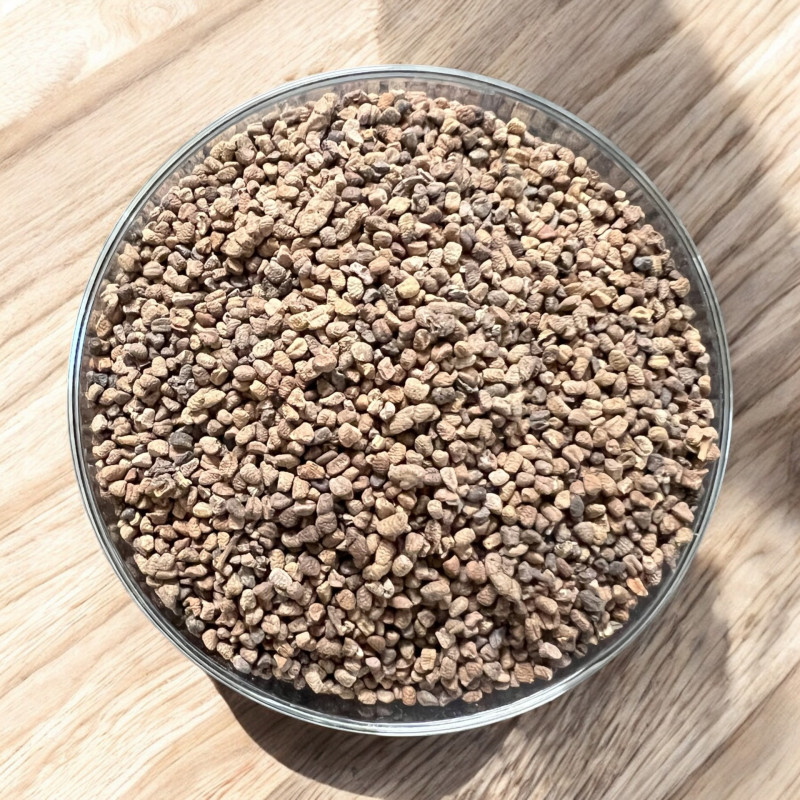
Reference: cardamomeM


Its flavor is powerful and unique, somewhere between licorice and eucalyptus, with a more lemony note.
Equally suited to both savory and sweet dishes, it adds a real delight to tea, coffee, gingerbread, Indian curries, rice, and even alcoholic drinks. You can even mix it with your pepper in your grinder!
 Delivery
Delivery
Mondial Relay
 Returns
Returns
See conditions
 Payments
Payments
100% secure
Livré en sachet refermable
Uses in Cooking and Beyond:
Here, we have the seeds found inside the green capsule of cardamom.
These shelled green cardamom seeds are literally magical for adding a fantastic "pep" when mixed with your pepper in a grinder. You can also toss a few seeds into your favorite tea or herbal infusion—it’s delicious!
Equally at home in both savory and sweet dishes, their powerful and extraordinary aroma, reminiscent of eucalyptus but more lemony, is best used in small quantities to avoid overpowering the flavors of your food. However, when used in moderation, they wonderfully enhance and complement dishes, making them a versatile ingredient.
Cardamom is widely used in Indian cuisine (tea, coffee, rice, curries), as well as in Asian and African (particularly Ethiopian) cooking. In Turkey, it’s common to place one seed in each cup of coffee. In Europe, cardamom is used in gingerbread (ground) and Scandinavian cuisine (aquavit and bread).
In India, it’s customary to chew a few seeds after a meal, aiding digestion and leaving your breath pleasantly fresh (it even neutralizes garlic breath!). It is also one of the few spices that can be thrown whole into rice cooking water to infuse the grains deeply.
In small amounts, cardamom complements many dishes: jams, ice creams, meat sauces, meat terrines, and white pudding.
Who am I?
Origin: Guatemala
Scientific name: Elettaria cardamomum
Cardamom is a rhizome-bearing herbaceous plant from the Zingiberaceae family (like ginger and turmeric), native to the Malabar Coast, where pepper also originates. Domesticated in southern India, it prefers warm, humid climates.
In Europe, cardamom made its appearance in the Middle Ages, when it was notably used in the spiced wine hypocras, served as an aperitif.
Cardamom is an expensive spice, harvested from dried fruits in the form of almond-green capsules about 1 cm long, containing three compartments filled with dark brown seeds that hold most of the fragrance. When dried, the capsule turns straw-colored. You can also find bleached cardamom (naturally sun-bleached, but more often artificially using chlorine, which is less appealing!).
Even the plant's leaves have the characteristic aroma when crushed! Flowers and fruits appear at the base of the stems.
A Little History:
Its name likely comes from India, passed down through the Arabs.
Data sheet
Specific References
Reference: cardamomeM
Reference: cardamomeverteE
Reference: hypocras
Reference: 00234301
Reference: 713425509
Reference: safranpistil
Reference: EPI230202
Reference: paella
Reference: 20701706
Reference: 9N7655101
Reference: rosepetale
Reference: cardamomeM
Reference: paprikafumé
Reference: 10M6810601
Reference: 508207101
Reference: L0012691123
Reference: 3913
Reference: badianeM
Reference: 4N7314501

Its flavor is powerful and unique, somewhere between licorice and eucalyptus, with a more lemony note.
Equally suited to both savory and sweet dishes, it adds a real delight to tea, coffee, gingerbread, Indian curries, rice, and even alcoholic drinks. You can even mix it with your pepper in your grinder!